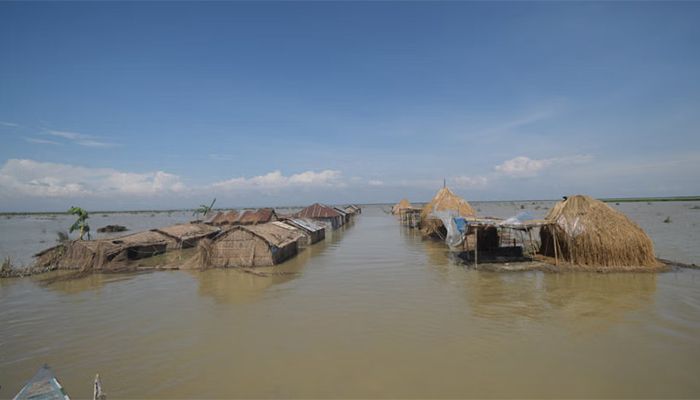
Desk Report
Publish: 23 Aug 2023, 02:19 pm

Photo: Collected
If global emissions keep rising and the climate change scenario gets worse, peak river flows in Bangladesh might rise by 36% between 2070 and 2099, according to a new study.
According to a study published today by the Centre for Climate Change Economics and the Grantham Research Institute on Climate Change and the Environment, floods presently submerge between 55 and 60 percent of Bangladesh annually and cause $1 billion in damages.
Over half of the country's population is at significant danger of flooding, the report finds. A crisis that will have significant humanitarian, economic, and environmental implications is turning a corner in Bangladesh.
Deep-seated causes of this problem include how climate change is causing unpredictable rainfall patterns, escalating flash floods, increasing sea levels, and accelerating glacial melting. According to the report, the situation has substantially worsened as a result of the growing effects of climate change, necessitating an immediate and thorough global response.
It also noted that Bangladesh's existing high humanitarian and financial costs associated with floods are anticipated to rise further as a result of climate change without further adaptation and resilience-building efforts. These floods are taking a growing toll on people's lives and the economy.
Between 1971 and 2014, 78 floods claimed over 41,783 lives and inflicted economic damages totaling $12.2 billion. The 2022 flood is estimated to have cost $1 billion and affected 7.3 million people, the report adds.
It says a low-carbon pathway is crucial for Bangladesh to tackle future flood crises.
Referring to the recent flood in Bandarban, the study says Bangladesh is under siege by water -- floods have reduced the population's ability to cope, triggering a cascade of setbacks that have long-lasting implications for their well-being and prosperity.
Although Bangladesh only produces 0.25 percent of the world's greenhouse gas emissions, the report said that their predicament highlights how intertwined climate action is. The existence of the country depends on a concerted worldwide effort to lessen the effects of climate change.
However, with contributions of 44% and 39%, respectively, and an expected peak in 2040, the agricultural and energy sectors are mostly to blame for the nation's emissions.
Subscribe Shampratik Deshkal Youtube Channel
Topic : Bangladesh Flood Mass People Food Crisis
© 2024 Shampratik Deshkal All Rights Reserved. Design & Developed By Root Soft Bangladesh